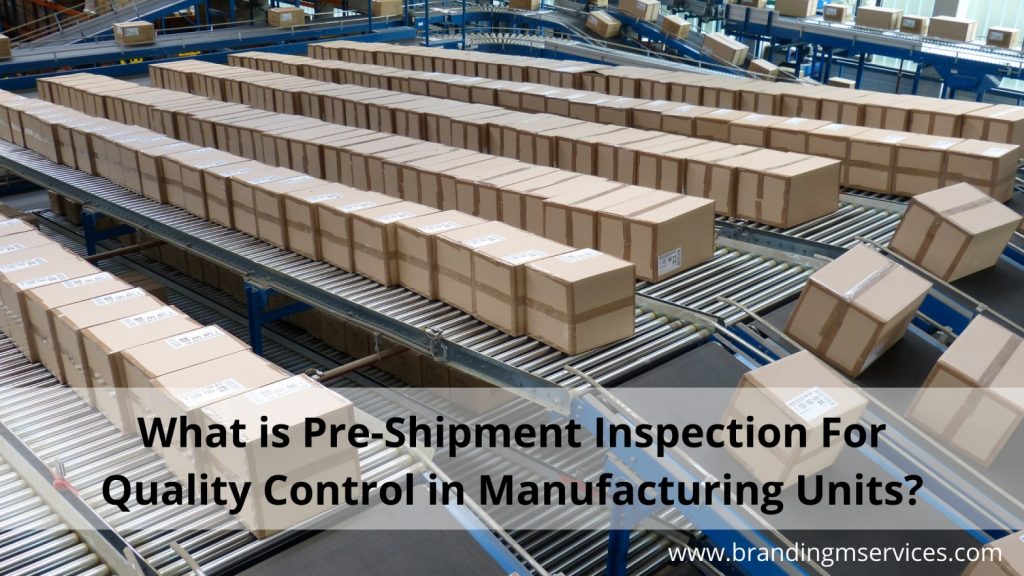What is Pre-Shipment Inspection for Quality Control in Manufacturing Units?
Do you know why a pre-shipment inspection is necessary to check the quality control? We often shop online and receive quality goods at our doorstep, but we don’t know how an industry keeps the quality of products.
Pre-shipment inspection (PSI) is an essential part of supply chain management, and it controls the quality of products after the production process. Almost every manufacturing unit uses PSI to check the quality control of products. Professional inspectors make sure that the quality of the product is good enough to deliver. Later on, you will find out how PSI can control the quality and what is the process behind it.
What is the Purpose of PSI?
The main purpose of PSI is to inspect the quality of finished products so that they are ready as per the client’s demand. The team inspects when 80-100% of the orders are ready for shipping.
The inspection is according to Acceptable Quality Limits (AQL) and will also base on the customer’s demand. The inspection team selects random sampling sizes from the finished products and goes through various inspection procedures (Visual/Cosmetic, Onsite tests – drop test, function check, etc).
PSI reduces the risk of bad quality products or any other production issues that are present and missed. In a way, the products are being checked against the quality of products before shipment. Conducting PSI before shipment will greatly reduce the risk of delivery delays or when receiving the products to realize it has grave issues and to be rejected which in terms cost more time and money to be wasted.
What is AQL?
The Acceptable Quality Limit (AQL) is the process of finding the percentage of acceptable quality levels. The purpose of AQL is to make sure that the product meets the requirements of acceptable quality level. If the product falls outside the boundary, then the products are usually rejected and needed to fix the issues before shipment.
AQL is a test that uses the range of numbers of defective components that will be tolerated during the inspection. The defects can be found through the electrical test or mechanical test. The defects are further divided into three categories based on their defective level:
- Critical
- Major
- Minor
To avoid any conflicts, the buyer and seller agree on the AQL standard, chosen by both of them according to their least level of risk.
Basic Steps Involved in PSI
PSI involves some steps used to carry out product quality control. The basic steps involve:
Quantity Verification
The professional inspectors first verify the quantity of packaged products matching the orders. They count the parcels and match them with the orders to ensure the correct quantity. The team of inspectors also performs the inspection to check the quantity and safety of products.
Random Inspection of Products
The team of inspection selects the random products to check for any defects. They make sure that the products are well organized and meet the need of an acceptable quantity level. They follow the AQL to check the acceptable quantity level of defective products. The whole batch will reject if the products don’t meet the requirements.
Workmanship Checking
The products are further checked for workmanship errors and defects as per product specifications. The products selected from the batch go through a team and professionals. The products are also checked for package, label, tag, and instruction as per demands. The team rejects the defective products, and the rest of the parcels ship to their desired destination.
Safety and Functional Test
The inspection team checks the products for safety measurements. The team analyzes packages to make sure that they are safe and well-sealed. The inspection team checks the products for:
- Mechanical safety checks
- Electrical safety checks
- Fire safety checks
Then the functional test carried out in which the products go through several tests like:
- Carton drop testing
- Pull test
- Stretch test
- Fatigue test
These tests ensure the quality control of packages.
Final Report
After the PSI, the final report is ready based on the tests and inspection. The team submitted the report to both the buyer and seller. The report carries all the necessary detailed information about the product inspection.
Pros of PSI
PSI helps inspect the product before the delivery, and it solves all the problems that need quality control in manufacturing units, especially pre-shipment inspection in china. If PSI doesn’t carry out, then the products will be of low quality, and no one will buy them.
There are several benefits of PSI that include:
- Reduce the risk of defected products
- Reduce the risk of being a fraud
- Enhance the quality of products
- Please buyer and seller
- Save time and money
- Prevent losses
PSI can ensure you that the products meet the required standard as per the client’s demand. It has many benefits, so you can’t neglect the importance of PSI when it comes to quality control.
How BMS Can Help
So, after all, you know how much PSI is important to control the quality, and it has several advantages. If you are looking for a pre-shipment inspection in China, then let us help you check your products’ quality control.
Branding Manufacturing services (BMS) will help you to solve your problems related to quality. We ensure that the products will be of high quality and meet the requirements as per the buyer’s demand. We can’t compromise on the quality because it’s our priority.
BMS has a team of professionals who deep dive into the product inspection and will conduct the research. We inspect the product so that it meets the international standard for trading. BMS can assure you that our team will give you top-notch quality inspection to meet your requirements before shipment.

